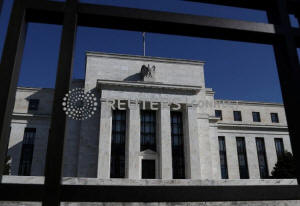|
Trump taps a strident Powell critic for
spot on Fed board
 Send a link to a friend
Send a link to a friend
 [March 23, 2019]
By Roberta Rampton [March 23, 2019]
By Roberta Rampton
PALM BEACH, Fla. (Reuters) - U.S. President
Donald Trump on Friday tapped Stephen Moore, a conservative economic
commentator and fellow critic of Federal Reserve policy under Chairman
Jerome Powell, to join the U.S. central bank's board of governors, a
move that would put a Trump loyalist inside the world's most important
financial institution.
Moore, who last year suggested in a radio interview that Trump had cause
to fire Powell for "wrecking our economy," would add a critical and
unconventional voice to a collegial committee that unanimously backed
Powell in keeping rate hikes on hold this month.
The group often reach policy decisions by consensus after debating the
issues.
"I will be nominating Mr. Moore to the Fed," Trump told reporters as he
arrived in Florida for a weekend trip. "He'll be great on the Fed."
Interviewed on Bloomberg Television on Friday after Trump's
announcement, Moore said he is an "independent voice" despite his close
ties to and support of Trump's policies and said he did not want to be a
"disruptor" but instead aimed to work closely with Powell "to try to
make sure that America grows as fast as it can."

He described remarks suggesting Powell and other Fed policymakers should
be fired as "probably written in a time of anger" given a "very
substantial mistake" the Fed made in raising rates in December.
Asked if the Fed should be cutting interest rates instead, he said was
unsure.
"One of the things that will be really interesting for me is to hear the
case, look at their data and then help make the decision about whether
we're too tight or too loose," Moore said.
Before joining the conservative Heritage Foundation think tank, Moore
had worked as an editorial page writer at the Wall Street Journal. He
also was an adviser to Trump's presidential campaign and holds a
master's degree in economics from George Mason University.
"I have known Steve for a long time – and have no doubt he will be an
outstanding choice!" Trump wrote on Twitter on Friday.
Elsewhere on Twitter, some conservative economists and fellow Fed
critics were less effusive.
"Trust me, Steve knows absolutely nothing about the Federal Reserve or
monetary policy," Bruce Bartlett, a supply-side economist who served in
the Republican administrations of Ronald Reagan and George H.W. Bush,
said on Twitter.
"Stephen Moore is unfit to serve on the Fed board," monetary economist
George Selgin, director of the libertarian Cato Institute's Center for
Monetary and Financial Alternatives said on Twitter.
SENATORS MUM
Moore, whose nomination would require Senate approval, helped write
Trump's signature tax plan. The nomination could test just how
successful Powell has been in his aggressive courting of lawmakers in
his first year as Fed chair.
Moore will likely face heavy criticism from Senate Democrats, with whom
he has clashed for years. The biggest question will be whether the
Republicans who have regularly met with Powell agree to advance someone
who has publicly chastised the head of the Fed and agreed that Trump has
the power to fire him.

A spokeswoman for Republican Senator Crapo, who leads the Senate banking
committee whose support is needed before a Fed governor can be
appointed, declined to comment. None of the other members of the
committee commented when contacted by Reuters about Moore's nomination.
The position would give Moore a vote at the policy-setting table of an
institution whose interest rate hikes last year were a frequent target
of Trump's ire.
The Fed has since put its rate hikes on hold, citing slowing global and
U.S. growth and low inflation.
In the Bloomberg Television interview, Moore said he was "not sure"
about whether the Fed should cut rates and also said he needed to
"reserve judgment" about the size of the Fed's bond holdings "because I
don't have the full knowledge that I need."
But he later added that "over time, obviously, we want to reduce that
balance sheet and not have these massive amounts of debt on the Fed
balance sheet."
[to top of second column]
|

Federal Reserve Board building on Constitution Avenue is pictured in
Washington, U.S., March 19, 2019. REUTERS/Leah Millis/File Photo

The Fed on Wednesday said it would stop scaling back the vast
portfolio of bonds they built up to spur an economic recovery from
the 2007-2009 financial crisis and recession.
In current conditions, the Fed said, it needs to have a balance
sheet of roughly $3.5 trillion - more than four times pre-crisis
levels - to manage interest rates, a portfolio that would, at some
point, need to begin slowly growing again over time.
SHIFTING VIEWS
Trump had actually won broad support for his first Fed picks,
including Powell, with economists on the left and right seeing them
as mainstream choices who could maintain the Fed’s independence from
political concerns, and extend a consensus shaped under previous Fed
chair Janet Yellen.
Along with Powell, Trump appointed respected academic economist
Richard Clarida as vice chair, Randal Quarles as vice chair for
regulation, and Kansas community banker Michelle Bowman.
The choice of Moore drew broad criticism, as economists across the
spectrum noted that Moore’s writings and comments seemed to confuse
basic concepts, and had been wildly inconsistent over time.
Trump picked Moore after speaking with him to compliment him on an
opinion article he co-authored in the Wall Street Journal, that
newspaper reported earlier, citing a senior administration official.
In the article Moore argued that the Fed's rate hikes promoted
deflation and described the central bank as the "last major
obstacle" to the United States staying on a good path.
While Moore has sided with Trump in chastising the Fed for raising
rates, he has in the past been just as vocal in critiquing the
central bank for not raising them.
In October 2015, when the unemployment rate was 5 percent, versus
3.8 percent today, and the Fed’s preferred measure of inflation was
just 1.2 percent, lower than today, Moore wrote in the Washington
Times: “(T)he Fed refused to raise interest rates off zero in
September, and, hello, that easy money policy is how we got into the
mess in 2000 and then in 2008. Wall Street cheered Janet Yellen’s
decision to keep the cheap dollars flowing. Isn’t this all starting
to sound familiar?”

In the same column, he urged Congressional Republicans to “put up a
fight on the debt ceiling by requiring more budget discipline as a
condition of higher debt levels.”
On Friday, the Treasury Department reported a record monthly budget
deficit of $234 billion.
Along with using technical terms to mean different things than most
economists, Moore in a 2014 co-authored paper argued the exact
opposite of the views he embraces today, urging the Fed to pull
liquidity from the economy by selling off its assets because of the
risk of inflation.
“The Fed may still suffer some 'losses' on these securities sales,
but the danger of future inflation and political pressure outweigh
the consequences of these losses,” he wrote.
The U.S. recovery then was still at a weak point, and Fed officials
at the time felt rates needed to remain low to support employment
and growth.
If confirmed by the Senate, Moore would fill one two open positions
on the Fed's seven-seat board.
"Presidents certainly use appointments to shape monetary policy -if
the Senate is willing to go along, that is," said Sarah Binder, an
economics professor at George Washington University.

(Additional reporting by Ann Saphir in San Francisco, David
Alexander and Howard Schneider in Washington and Trevor Hunnicutt in
New York; Editing by Kim Coghill and Meredith Mazzilli)
[© 2019 Thomson Reuters. All rights
reserved.]
Copyright 2019 Reuters. All rights reserved. This material may not be published,
broadcast, rewritten or redistributed.
Thompson Reuters is solely responsible for this content. |